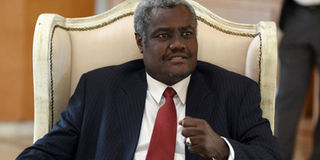Will Moussa Faki Mahamat stop Africa from bleeding?

Moussa Faki Mahamat won the race to head the African Union Commission for the next four years. Agency Photo
What you need to know:
- Extrapolating from the Mbeki report, Africa would have lost an additional over $100 billion between January 2015 when the African leaders unanimously adopted the report, and January 2017 when Mahamat entered office.
- This continuous loss of several billion dollars eats away at Africa’s ability to finance its own development. Advancing the recommendations of the Mbeki report would go a long way in stopping illicit outflows, and contribute to turning Africa into an “influential partner with a significant role in world affairs” as per AU aspirations.
Moussa Faki Mahamat won the race to head the African Union Commission for the next four years. The Chadian diplomat eventually edged out Kenya’s Amina Mohamed, who was initially in the lead in last month’s elections in Addis Ababa.
As he begins his tenure, the race ahead of him appears steeper than the one he just won.
Mahamat inherits a “bleeding” continent in two respects. Beyond the spilling of blood in conflict-ridden African countries, the continent is also suffering massive illicit outflows of its resources to well-known destinations. The problems have been discussed, the solutions have been debated and agreed, but action has not always been swift. Mahamat knows this only too well.
At the historic candidates’ debate that the AU held last December, (code-named Mjadala Afrika,) Mahamat opened his remarks by reminding his audience that Africa’s priorities are already set. “Where the Chair of the African Union Commission comes in, is to ensure the proper and methodical implementation of Africa’s decisions.” He lamented the fact that of the 1800 decisions taken by the African Union since its launch in 2002, many are still awaiting implementation.
Pointing to Agenda 2063, Africa’s 50-year transformation plan, Mahamat emphasised that in fact, we already have clear roadmaps for Africa’s aspirations.
So, what do the next four years look like for Faki Mahamat?
Agenda 2063 has two aspirations with a timeline of the year 2020, falling squarely in Mahamat’s tenure. The first is that, “all guns will be silent.” Africa’s leaders have pledged to end all wars in Africa by 2020 so as “not to bequeath the burden of conflicts to the next generation of Africans.”
This means that somewhere before the end of Mahamat’s four-year tenure, we expect the good work of the African Peace and Security Architecture to deliver this final silence. All gunfire currently raging in South Sudan, Somalia, Mali, the Democratic Republic of Congo, Central African Republic, Burundi, Guinea Bissau, and Libya, will have ceased and found sustainable solutions.
Also by 2020, “all remnants of colonialism will have ended and all African territories under occupation fully liberated.” In methodically implementing these AU decisions, Mahamat also needs to oversee the establishment of an African Human Security Index (AHSI) to monitor progress.
And while finding resources to address Africa’s development agenda is a big question, there is still the bigger (and related) question of Africa’s resources that are draining out of the continent.
In January 2015, African Union leaders learnt from President Thabo Mbeki that by all estimates, the continent is losing more of its resources through illicit financial outflows, than the total official development assistance (ODA) to Africa. The Mbeki report estimated the recorded illicit outflows conservatively at $50 to $60 billion every year, from just one of the three aspects of illicit outflows.
Extrapolating from the Mbeki report, Africa would have lost an additional over $100 billion between January 2015 when the African leaders unanimously adopted the report, and January 2017 when Mahamat entered office. This continuous loss of several billion dollars eats away at Africa’s ability to finance its own development. Advancing the recommendations of the Mbeki report would go a long way in stopping illicit outflows, and contribute to turning Africa into an “influential partner with a significant role in world affairs” as per AU aspirations.
Mahamat is clear on the need to accelerate implementation of Africa’s decisions. He is willing to act and recognises that it will sometimes entail taking calculated risks. Basing on his campaign promise, we expect expeditious actions, and this would be a giant leap towards shaping the Africa we want.
Mr Banoba is Africa Regional Advisor at Transparency International. [email protected]


